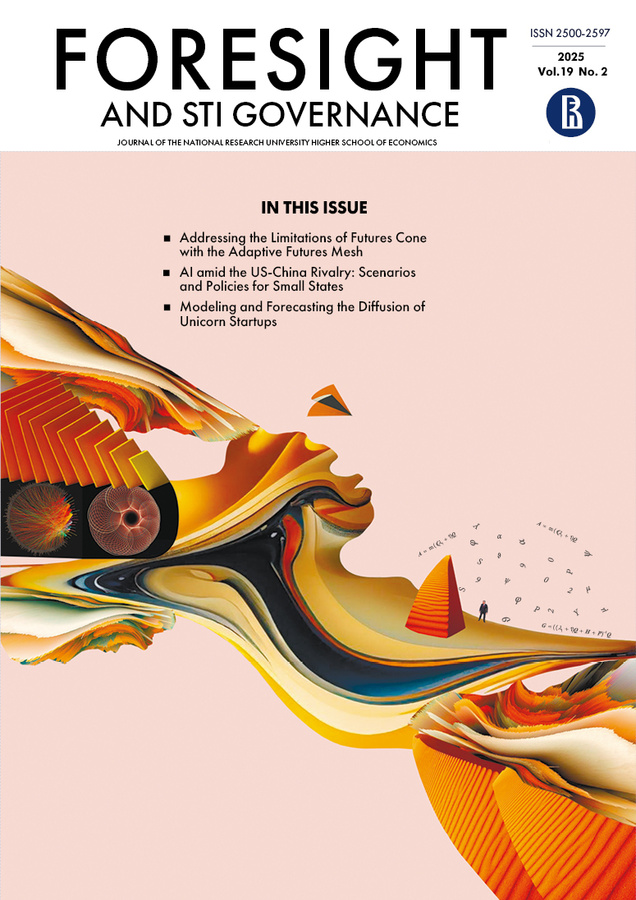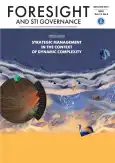Strategies of Dynamic Complexity Management
- Authors: Knyazeva H.1
-
Affiliations:
- HSE University
- Issue: Vol 14, No 4 (2020)
- Pages: 34-45
- Section: STRATEGIС FORESIGHT
- URL: https://journal-vniispk.ru/1995-459X/article/view/346967
- DOI: https://doi.org/10.17323/2500-2597.2020.4.34.45
- ID: 346967
Cite item
Abstract
The modern theory of complex systems changes our view of historical processes, accompanied by uncertainties, instabilities and ambiguities. The knowledge of this theory allows us to master a system or holistic thinking, and to understand the laws of functioning and growth of not just structural, but dynamic complexity. Uncertainties and chaotic elements that indicate any state of crisis are not only negative factors that we should beware of and not without fear to worry about them. We can learn to manage them and use them in the way of renewal of social systems, producing innovations. The strategic vision of complex systems evolution becomes an effective tool for decision making and scenarios planning based on our participatory activities with alternative futures. The article examines the case of Shell Corporation, which has been using scenario thinking technologies since the early 1970s, which has given it incredible competitive advantages and incentives for rapid growth and transformation into an international energy giant.
References
- Ashby W.R. (1958) Requisite Variety and its implications for the control of complex systems // Cybernetica. Vol. 1. № 2. Р. 83-99.
- Atlan H. (1979) Entre le cristal et la fumee. Essai sur l'organisation du vivant. Paris: Editions du Seuil.
- Bakshi V. (2017) Forward-looking Manager in a VUCA World. Los Angeles: SAGE.
- Bentnam J. (2014) The scenario approach to possible futures for oil and natural gas // Energy Policy. Vol. 64. P. 87-92. Режим доступа: , дата обращения 29.08.2020. DOI:https://doi.org/10.1016/j.enpol.2013.08.019
- Berthoz A. (2009) La Simplexite. Paris: Odile Jacob.
- Cornelius P., van der Putte A., Romani M. (2005) Three Decades of Scenario Planning in Shell // California Management Review. Vol. 48. № 1. P. 92-110. Режим доступа:https://doi.org/10.2307%2F41166329, дата обращения 29.08.2020.
- De Rosnay J. (1975) Le Macroscope. Vers une vision globale. Paris: Editions du Seuil.
- Deaton A.V. (2018) VUCA Tools for a VUCA World: Developing Leaders and Teams for Sustainable Results. Glenn Allen, VA: DaVinci Resources.
- Dupuy J.-P. (2010) Le future bifurque-t-il? Vers une nouvelle science de la future // Bifurcations. Les sciences sociales face aux ruptures et a l'evenement / Eds. M. Bessin, C. Bidart, M. Grossetti. Paris: Editions La Decouverte. P. 373-386.
- Erdi P. (2008) Complexity Explained. Heidelberg, New York, Dordrecht, London: Springer.
- Francois C. (1999) Systemics and Cybernetics in a Historical Perspective // Systems Research and Behavioral Science. Vol. 16. P. 203-219. Режим доступа: :3<203::AID-SRES210>3.0.CO;2-1, дата обращения 29.08.2020. DOI:https://doi.org/10.1002/(SICI)1099-1743(199905/06)16
- Fuller R.B. (1997) Synergetics: Explorations in the Geometry of Thinking. New York: Macmillan.
- Gell-Mann M. (1995) The Quark and the Jaguar. Adventures in the Simple and the Complex. London: Abacus.
- Gell-Mann M. (1996) Let's Call It Plectics // Complexity. Vol. 1. № 5. P. 96.
- Gharajedaghi J. (2011) Systems Thinking. Managing Chaos and Complexity: A Platform for Designing Business Architecture. Burlington, MA: Morgan Kaufmann.
- Godfrey-Smith P. (1996) Complexity and the Function of Mind in Nature. Cambridge: Cambridge University Press.
- Gonzalez W.J. (2013) The Sciences of Design as Sciences of Complexity: The Dynamic Trait // New Challenges to Philosophy of Science. The Philosophy of Science in a European Perspective / Eds. H. Andersen, D. Dieks, W.J. Gonzalez, Th. Uebel, G. Wheeler. Vol. 4. Heidelberg, New York, Dordrecht, London: Springer. P. 299-311.
- Haken H. (1977) Synergetics. An Introduction. Berlin: Springer.
- Haken H. (1995) Erfolgsgeheimnisse der Natur. Synergetik: Die Lehre vom Zusammenwirken. Berlin: DVA. ISBN: 978-3-548-34220-7
- Hodgson A. (2020) Systems Thinking for a Turbulent World: A Search for New Perspectives. New York: Routledge.
- Jackson M.C. (2006) Creative Holism: A Critical Systems Approach to Complex Problem Situations // Systems Research and Behavioral Science. Vol. 23. № 5. P. 647-657. Режим доступа: , дата обращения 29.08.2020. DOI:https://doi.org/10.1002/sres.799
- Jackson M.C. (2019) Critical Systems Thinking and the Management of Complexity: Responsible Leadership for a Complex World. Hoboken, NJ: Wiley.
- Jefferson M. (2012) Shell scenarios: What really happened in the 1970s and what may be learned for current world prospects // Technological Forecasting and Social Change. Vol. 79. № 1. P. 186-197. Режим доступа: , дата обращения 29.08.2020. DOI:https://doi.org/10.1016/j.techfore.2011.08.007
- Jonas H. (1984) The Imperative of Responsibility: In Search of an Ethics for the Technological Age. Chicago: University of Chicago Press.
- Keating C.B., Katina P.F. (2019) Complex System Governance: Concept, Utility, and Challenges // Systems Research and Behavioral Science. Vol. 36. № 5. P. 687-705. Режим доступа: , дата обращения 29.08.2020. DOI:https://doi.org/10.1002/sres.2621
- Knyazeva H., Kurdyumov S.P. (2001) Nonlinear Synthesis and Co-evolution of Complex Systems // World Futures. Vol. 57. P. 239-261. DOI:https://doi.org/10.1080/02604027.2001.9972831
- Kok J. (2018) Leading in a VUCA World. Heidelberg, New York, Dordrecht, London: Springer.
- Laszlo E. (2012) The Chaos Point. The World at the Crossroads. London: Piatkus.
- Laudicina P.A. (2012) Beating the Global Odds: Successful Decision-making in a Confused and Troubled World. New York: Wiley.
- Le Moigne J.-L. (1994) Le constructivisme. Vol. 1. Paris: ESF editeur.
- Luhmann N. (1987) Soziale Systeme. Grundri? einer allgemeinen Theorie. Frankfurt: Suhrkamp.
- Mainzer K. (2007a) Der kreative Zufall: wie das Neue in die Welt kommt. Munchen: C.H. Beck.
- Mainzer K. (2007b) Thinking in Complexity: The Computational Dynamics of Matter, Mind, and Mankind (5th ed.). Heidelberg, New York, Dordrecht, London: Springer.
- Mandeville B. (1997) The Fable of the Bees, and Other Writings. Indianapolis, IN: Hackett Pub.
- Mitchell M. (2009) Complexity. A Guided Tour. Oxford, New York: Oxford University Press.
- Morin E. (1977) La methode. La nature de la nature. Paris: Editions du Seuil.
- Morin E. (1999) Les sept savoirs necessaires a l'education du futur. Paris: UNESCO.
- Morin E. (2002) Le complexus, ce qui est tisse ensemble // La Complexite, vertiges et promesses / Ed. R. Benkirane. Paris: Le Pommier. P. 5-35.
- Nandram S.S., Bindlish P.K. (eds.) (2017) Managing VUCA through Integrative Self-management. Heidelberg, New York, Dordrecht, London: Springer.
- Nijs D.E.L.W. (2015) Introduction: Coping with Growing Complexity in Society // World Futures. Vol. 71. № 1. P. 1-7. DOI:https://doi.org/10.1080/02604027.2015.1087223
- Pink D. (2005) A Whole New Mind: Moving from the Information age to the Conceptual Age. New York: Riverhead Books.
- Prigogine I. (1989) The Philosophy of Instability // Futures. Vol. 21. № 4. P. 396-400. Режим доступа: , дата обращения 29.08.2020. DOI:https://doi.org/10.1016/S0016-3287(89)80009-6
- Prigogine I. (1997) The End of Certainty - Time's Flow and the Laws of Nature. New York: The Free Press.
- Prigogine I. (2000) The Die is not Cast // Futures. Bulletin of the World Futures Studies Federation. Vol. 25. № 4. P. 17-19.
- Ramirez R., Wilkinson A. (2016) Strategic Reframing: The Oxford Scenario Planning Approach. Oxford: Oxford University Press.
- Robinson K. (2005) Towards a Metaphysics of Complexity // Interchange. Vol. 36. P. 159-177. Режим доступа: , дата обращения 29.08.2020. DOI:https://doi.org/10.1007/s10780-005-2352-0
- Ruth B. (1961) Patterns of Culture. Boston: Houghton Mifflin.
- Sartenaer O. (2016) Sixteen Years Later: Making Sense of Emergence (Again) // Journal for General Philosophy of Science. Vol. 47. № 1. P. 79-103. Режим доступа: , дата обращения 29.08.2020. DOI:https://doi.org/10.1007/s10838-015-9312-x
- Senge P.M. (2006) The Fifth Discipline: The Art and Practice of the Learning Organization. New York: Doubleday/Currency.
- Spangenberg J. (2020) System Complexity and Scenario Analysis. Paper presented at the Ninth Biennial Conference of the International Society for Ecological Economics Ecological Sustainability and Human Well-Being, December 15-18, New Delhi, India. Available at:https://citeseerx.ist.psu.edu/viewdoc/download?doi=10.1.1.543.4782&rep=rep1&type=pdf, accessed 13.09.2020.
- Spire A. (1999) La pensee - Prigogine, suivi de trois entretiens avec Gilles Cohen-Tannoudji, Daniel Bensaich et Edgar Morin. Paris: Desclee de Brouner.
- Taleb N.N. (2010) The Black Swan: The Impact of the Highly Improbable (2nd ed.). New York: Random House.
- Thompson E. (2007) Mind in Life. Biology, Phenomenology and the Sciences of Mind. Cambridge, MA: Harvard University Press.
- Von Bertalanffy L. (1932) Theoretische Biologie. Vol. 1. Berlin: Gebruder Borntraeger.
- WBSCD (2010) Vision 2050: The New Agenda for Business. Geneva: World Business Council for Sustainable Development.
- Wack P. (1985) Scenarios: Shooting the Rapids // Harvard Business Review. November-December Issue. P. 139-150.
- Wilkinson A. (2014) The Essence of Scenarios: Learning from the Shell Experience. Amsterdam: Amsterdam University Press.
- Wilkinson A., Kupers R. (2013) Living in the Futures // Harvard Business Review. Vol. 91. № 5. P. 118-127.
- Wilkinson A., Kupers R., Mangalagiu D. (2013) How Plausibility-based Scenario Practices are Grappling with Complexity to Appreciate and Address 21st Century Challenges // Technological Forecasting & Social Change. Vol. 80. № 4. P. 699-710. Режим доступа: , дата обращения 29.08.2020. DOI:https://doi.org/10.1016/j.techfore.2012.10.031
Supplementary files









